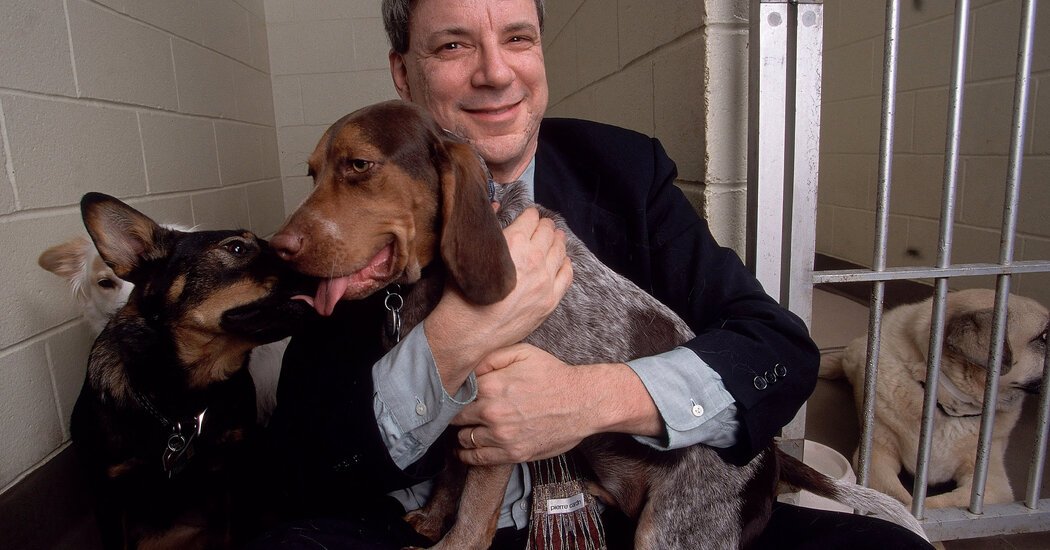Steven M. Wise, a pioneering animal rights lawyer who gave voice to clients unable to testify on their own behalf, demanding the same moral and legal entitlements as their owners, keepers and custodians, died on Feb. 15 at his home in Coral Springs, Fla. He was 73.
The cause was complications of glioblastoma, an aggressive form of brain cancer, his child Siena Wise said.
Like John Scopes, the Tennessee teacher of evolution at the center of the so-called monkey trial nine decades earlier, Mr. Wise lost his legal battles — trying in his case, not to upgrade animals as our immediate antecedents on the human family tree but to recognize their personhood as cognitive, emotional and social beings who have the same moral and statutory entitlement to freedom that people do. (Unlike Mr. Wise, John Scopes won on appeal.)
Mr. Wise was the first president of the Animal Legal Defense Fund and the founder and president of the Nonhuman Rights Project. He also taught courses on animal rights at Harvard and other law schools.

He wrote several books, including “Rattling the Cage: Toward Legal Rights for Animals” (2000), which the legal scholar Cass R, Sunstein, in a New York Times review, called “an impassioned, fascinating and in many ways startling book”; “Drawing the Line: Science and the Case for Animal Rights” (2002); “Though the Heavens May Fall: The Landmark Trial That Led to the End of Human Slavery” (2005), a best seller about an English case that determined that a slave was a person with legal rights; and “An American Trilogy: Death, Slavery, and Dominion on the Banks of the Cape Fear River” (2009).
In 2013, after decades of legal and scientific research, the Nonhuman Rights Project filed what it characterized as a groundbreaking writ of habeas corpus — requiring the authorities to produce an incarcerated person before a judge. However, the petition was not for a human being but for Tommy, a chimpanzee being held in a shed at a used-trailer lot in Gloversville, N.Y., by a man who said he had rescued him from someplace even worse.
Previously, lawyers had expanded the definition of animal welfare (as opposed to animal rights) by encompassing the treatment of animals in scientific research and in animal husbandry. Comparing legal attitudes toward animals with human enslavement before the Civil War, Mr. Wise said animal rights laws would offer more protection than anti-cruelty statues against, for example, state-sponsored deer hunts and the Navy’s deployment of dolphins on life-threatening duties.
“Certain species are capable of complex emotions, can communicate using language and have a sense of self,” Mr. Wise said in a 2005 lecture, “all characteristics that once defined humanity.”
“I don’t see a difference,” he added, “between a chimpanzee and my 4-year-old son.”
After losing in a lower court, Mr. Wise argued before an Appellate Division panel in Albany, N.Y., that Tommy “can understand the past, he can anticipate the future, and he suffers as much in solitary confinement as a human being.”
Mr. Wise was not proposing a “Planet of the Apes” scenario or suggesting that animals be given the right to vote; rather, he was proposing what he called “bodily liberty” in one of the eight preserves in the North American Primate Sanctuary Alliance.
In an interview with the nonprofit organization My Dreams for Animals, he defined bodily liberty: “Our cases are not about whether they are being treated well or ill in captivity — they’re about whether they should be held in captivity at all.”
But the appellate court ruled unanimously against the notion that Tommy the chimp be given legal status as a person, similar to the protections granted corporations, holding that, “unlike human beings, chimpanzees cannot bear any legal duties, submit to societal responsibilities or be held legally accountable for their actions.”
“In our view,” the court said, “it is this incapability to bear any legal responsibilities and societal duties that renders it inappropriate to confer upon chimpanzees the legal rights.”
Around the same time, habeas corpus writs filed by the Nonhuman Rights Project on behalf of three other chimpanzees in New York State also lost in the courts, although Stony Brook University returned the animal it was studying to the New Iberia Research Center in Louisiana.
Tommy was featured in “Unlocking the Cage” a 2016 documentary about the Nonhuman Rights Project directed by Chris Hegedus and D.A. Pennebaker. According to some sources, he also appeared with Matthew Broderick in the 1987 film “Project X.”
Mr. Wise suggested that eight other species might deserve the same rights as chimps:gorillas, orangutans, bonobos, Atlantic bottlenose dolphins, African gray parrots, dogs, honeybees and African elephants (including one at the Bronx Zoo, whose legal status his organization unsuccessfully challenged).
He cited a test conducted on great apes whose faces were dabbed with a red dot. When they looked in the mirror, they reached for the dot on their faces, not in the reflection, indicating a sense of self.
The notion of nonhuman animal rights has perturbed numerous legal scholars, prominent among them Richard A. Posner, a former federal judge who taught at the University of Chicago.
“If we fail to maintain a bright line between animals and human beings,” Mr. Posner once said, “we may end up by treating human beings as badly as we treat animals.”
Other scholars disagree. Laurence H. Tribe, a professor emeritus at Harvard Law School, said in an email that Mr. Wise “will be remembered well beyond our time as one of the most farsighted and influential pioneers in the history of animal rights and animal welfare.”
“Steve’s writing, litigation strategy and organizational energy have taken our efforts to protect nonhuman animals from unspeakable wrongs to a new and promising level,” Professor Tribe added.
Martha C. Nussbaum, a philosopher and professor of law and ethics at the University of Chicago, said of Mr. Wise that she “disagreed with his theoretical approach but respected him greatly and supported his practical efforts.” So far, Professor Nussbaum said by email, those efforts on behalf of chimps and elephants “have persuaded only dissenting judges, but that is the first step toward persuading a majority.”
Steven Mark Wise was born on Dec. 19, 1950, in Baltimore to Selma (Rosen) Wise, who managed the household, and Sidney Wise, a consultant to NATO.
He earned a Bachelor of Science degree in chemistry at the College of William & Mary in Williamsburg, Va., in 1972. His involvement in the campus antiwar movement sparked a concern for social justice and led him to study law at Boston University, where he earned a degree in 1976.
In 1980, after a friend gave him a copy of “Animal Liberation: A New Ethics for Our Treatment of Animals” (1975), by the Australian philosopher Peter Singer, Mr. Wise was transformed from an unfulfilled personal injury and criminal defense lawyer into a fervid animal rights crusader.
He initially defended individual animals, including dogs condemned to death for attacking humans, and was the president of the Animal Legal Defense Fund from 1985 to 1995. He then founded the Center for the Expansion of Fundamental Rights, which became known as the Nonhuman Rights Project.
In addition to Siena Wise, his child from his marriage to Debra Slater, which ended in divorce, Mr. Wise is survived by his wife, Gail Price-Wise; a daughter, Roma Augusta, from his first marriage, to Marylou Masterpole, which also ended in divorce; a son, Christopher, from his marriage to Ms. Slater; and a brother, Robert. He is also survived by Yogi, a Yorkshire terrier-Maltese mix, whom he described as his canine companion.
(Tommy, the chimp, is believed to have died in 2022 in a zoo in Michigan.)
Considering his upbringing, Mr. Wise was an improbable champion of animal rights. He recalled that his mother “was always serving meat for meals” and wore a mink coat. He had dogs and goldfish as pets, he said, but as for his relationship with other animals, “I never really had any contact with them except with respect to eating them.”
By the time he was 11, though, he was so appalled at how chickens were crammed into cages at a farmers’ market that he wrote to a state legislator to complain. He later became a vegetarian and stopped wearing leather.
“I try to respect nonhuman animals,” he told The Times in 2002. “I don’t eat them. I don’t wear them. I try to avoid being involved in the abuse of them. But you do grow up with certain things. Sometimes, I’ll be walking on a street and I’ll smell roast beef; I’ll simultaneously feel attraction and repulsion.”










